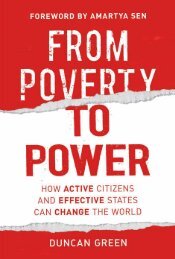Africa's Missing Billions - Oxfam International
Africa's Missing Billions - Oxfam International
Africa's Missing Billions - Oxfam International
You also want an ePaper? Increase the reach of your titles
YUMPU automatically turns print PDFs into web optimized ePapers that Google loves.
Diversion from stockpiles: As stated in Section 4, leakage from statestockpiles are a key source of weapons for armed groups, and also akey contributor to armed crime.According to Gun Free South Africa, an estimated 16,893 weaponswere stolen or lost from the South African Police Force between 1990and 2002, and 1,759 from the South African National Defence Force,the majority of which were assault rifles, between 1994 and 2003. 126The ATT would put a legal obligation on arms exporters to considerthe possibility of diversion from stockpiles before agreeing to transferarms. Again, increased funding for improvements to stockpilesecurity may be required and, in some cases, exports should bepreceded by a programme to improve stockpile management.6 ConclusionsEvery effort must be made to limit the enormous social and economiccost of armed violence. Our rough estimate is that armed conflictalone has cost Africa around $300bn (constant year 2000 $) since 1990,or around $18bn per year – costing each conflict country, on average,15 per cent of its GDP.Many things need to be done to reduce armed violence, and of coursethe poverty that lies behind much of it. Preventing arms proliferationis a multi-faceted issue and one that requires a plethora of measures,which address both supply and demand. In terms of supply, weestimate that 95 per cent of Africa’s most commonly used conflictweapons (Kalashnikov derivatives) and the vast majority of otherarms and ammunition are not made in Africa. It is true that manyweapons used in Africa are recirculated, but there are still continuousnew supplies of weapons and ammunition to state and non-stateactors.Indeed, preventing the supply of ammunition into zones of armedviolence is an often overlooked strategy in limiting armed violence.According to the UN Panel of Experts on Somalia, ‘When a seriousconfrontation is anticipated, larger quantities of arms and, moreimportantly, ammunition enter the Mogadishu market.’ 127 At aminimum, a shortage of ammunition is likely to impose a ‘shootingdiscipline’ that could prevent some violations of human rights. 128Thus there is an urgent need to address the international supply ofarms and ammunition. An effective ATT, based on the ‘golden rule’,is vital to reduce the human and economic costs of armed violence inAfrica and across the world. Such an ATT would need to come withsupport and capacity-building to ensure effective implementation.26Africa’s missing billions, IANSA, <strong>Oxfam</strong>, and Saferworld, October2007















